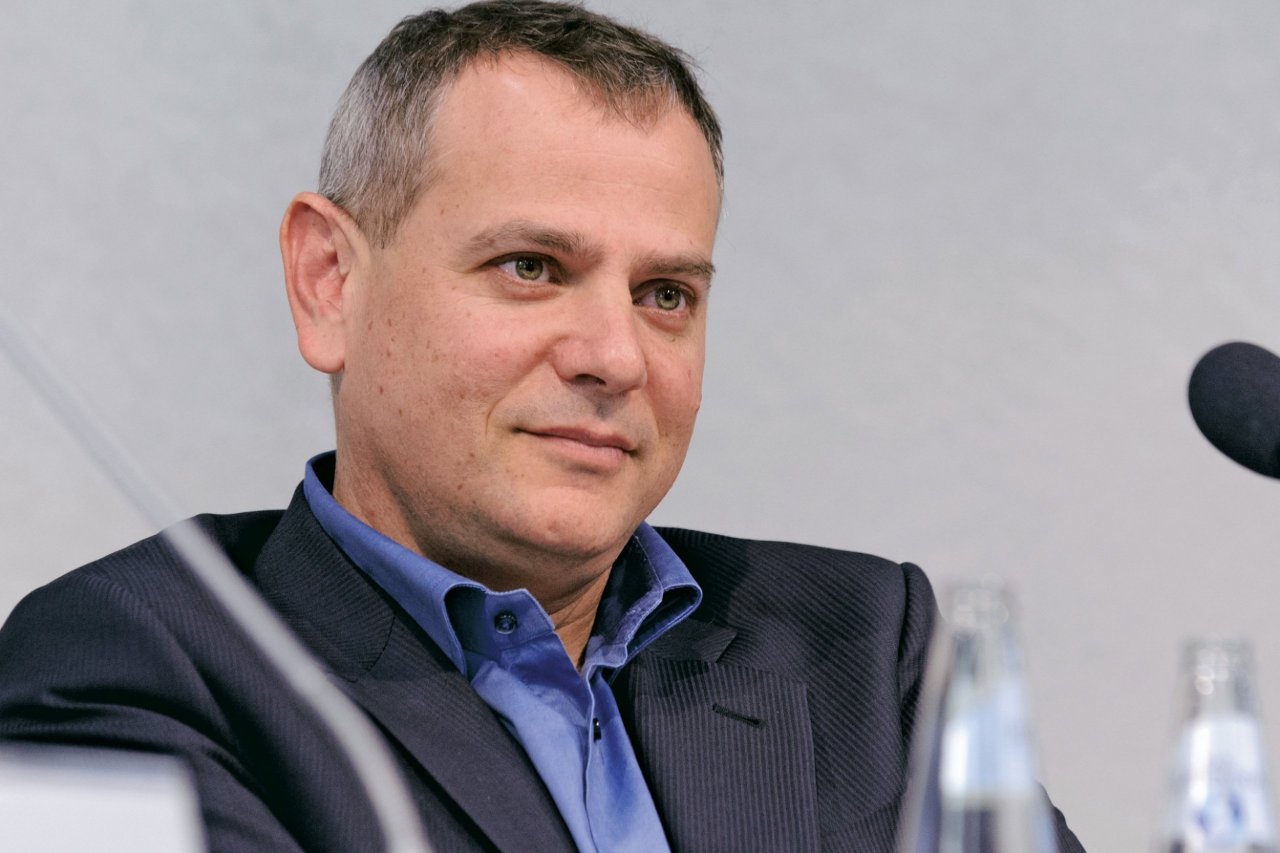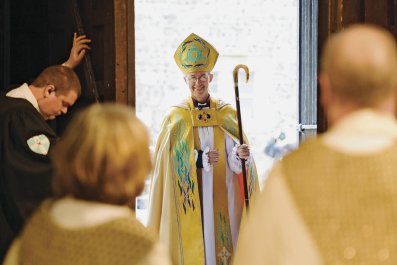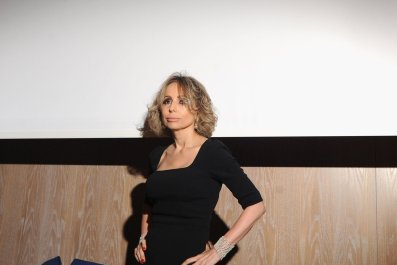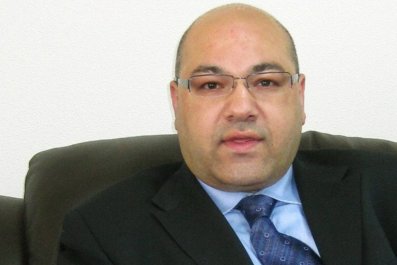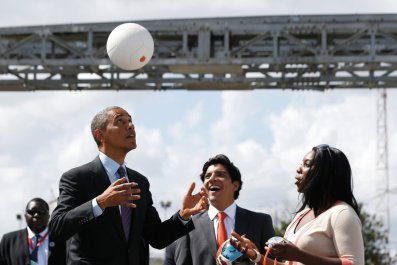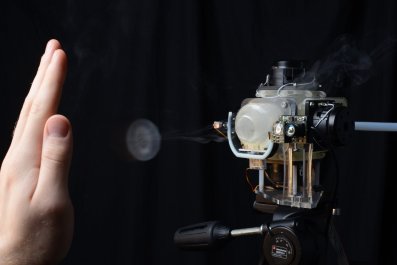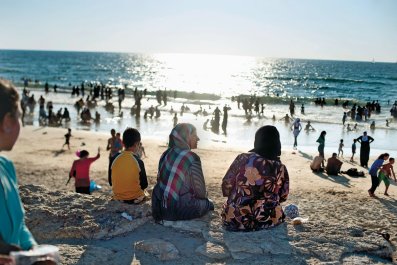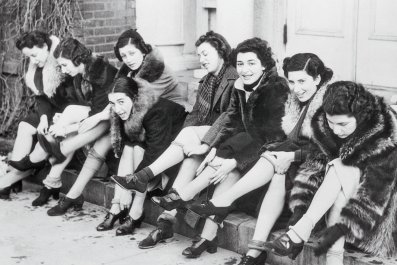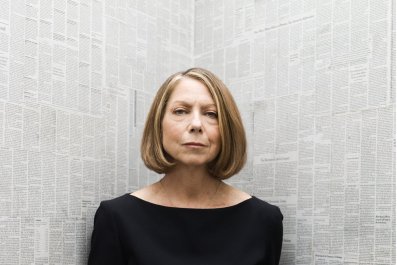When Barack Obama made history in November 2008, Nitzan Horowitz, then covering the campaign for Israel's Channel 10, had a front-row seat. If Horowitz has his way, he too will make history this October: the left-wing Knesset member is vying to become the first gay mayor of Tel Aviv—indeed, the first openly gay mayor of any big city in the Middle East.
"I've been active in the gay community for many years, but I want to be the mayor of everyone—gay and straight, Jewish and Arab, secular and religious," Horowitz, 48, tells me at his office in the Knesset. Like most Knesset members, Horowitz is dressed casually, wearing a powder blue button-down and jeans. On his desk sits a framed picture of him with his partner of 11 years, Ido, at Yellowstone National Park; on the wall hang photos of him with George W. Bush, Hamid Karzai, and other world leaders he met during his journalism career; and next to a portrait of his favorite prime minister, Yitzhak Rabin, is a "Change we can believe in" license plate with Obama's picture.
"I learned a lot from Obama's campaign," Horowitz says. "I was extremely impressed not only by his speeches, but by the way he raised money, the way he mobilized people." Horowitz could certainly benefit from the Obama playbook. Like the freshman Illinois senator in 2008, he is facing a formidable opponent: current mayor Ron Huldai, who for the past 15 years has presided over Tel Aviv's metamorphosis into an international technological and tourist hub. And like Obama, Horowitz is making his case from the left. His campaign theme against the Labor-aligned Huldai, he tells me, was "a city for all its inhabitants, not just the big money."
Horowitz, who represents the leftist Meretz Party, is a European-style socialist—"cradle to Ph.D.," as he puts it—and wants to bring the best of the continent to Tel Aviv: Berlin's public-transportation grid to solve the city's congestion problem; Paris's educational system—Horowitz lived in the city for six years as a foreign correspondent—to improve its schools; and Amsterdam's rent-control policies to provide affordable housing to the increasing number who cannot afford to live in Israel's most expensive city.
While he says he is not running as "leader of the gay community," he also hopes to use the mayoral bully pulpit to advance LGBT rights. "The mayor of Tel Aviv is one of the most influential people in this country, so he can set examples on many issues," he explains. "For example, if the mayor decides to promote tolerance and gay rights in schools, then he can change the atmosphere all over the country."
If there is a country in the Middle East that is ready for a gay mayor, it is doubtless Israel, and if there is a place in Israel that is ready, it is doubtless Tel Aviv. In a survey conducted last year by American Airlines and GayCities.com, Tel Aviv was overwhelmingly chosen as the world's top gay tourist destination with 43 percent of the vote (runner-up New York got 14 percent). Last month the city's annual gay-pride parade drew a record 100,000.
But Horowitz argues that Israel, and even Tel Aviv, has a long way to go. Many high schools, he notes, are still closed to gay organizations. Gay representation in public institutions is poor (Horowitz is the only openly gay Knesset member out of 120). Gay couples have difficulty adopting. And though polls show majority support for gay marriage in Israel, it is still a long way off. (Marriage here is controlled by religious authorities, meaning that it is closed not just to gay couples, but to interreligious couples as well.)
Of course, Horowitz remains an underdog. A poll taken earlier this summer, shortly after he announced his candidacy, gave Huldai a commanding lead with 53 percent. Horowitz, though towering over other challengers, lagged behind at 26 percent. But the seeds for an upset could be there. On the name-recognition front, Horowitz still has room to grow. Meretz, which is on an upswing nationally, has a healthy base of support in Tel Aviv. In January's Knesset elections, the party got a nationwide high there of 14 percent, just 3 points behind Labor. In the last mayoral election, fellow Knesset member Dov Khenin—who, coming from the communist-rooted party Hadash, is to Horowitz's left—managed to get 34 percent. If Horowitz can rally the city's gay population and capture the imagination of the city's youth, he could make a race of it.
Horowitz certainly has no shortage of motivations—from the chance to make history to more mundane incentives. "People ask me, 'Why are you running?'" he tells me. "I say, to tell you the truth, it is my only chance to get a parking spot in Tel Aviv."
Ben Birnbaum is a writer based in Israel.


